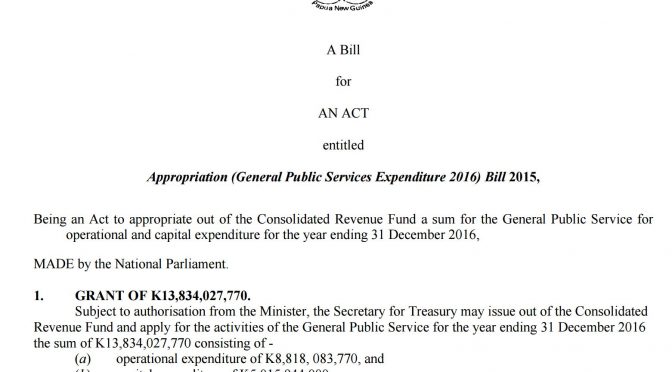Executive Summary
- The 2016 Budget appears to have failed in its constitutional requirements to appropriate sufficient funding for the activities of government
- This includes servicing debt (amortization).
- The Opposition is correct to highlight the absurd differences between the 2016 and 2017 budgetary appropriations
- But the error appears to be in the 2016 budget
- One that was rushed through without the chance for adequate democratic scrutiny by the Opposition
- Holders of Government Bills and Bonds may now have to pay the price – as they did in the Kokopo Loans Affair
- And possibly the public more broadly.
- A Supplementary Budget should have been passed at the start of this week to correct the possible constitutional error that had already been pointed out to government by a local PNG analyst (my hat off to her – PNG needs more local analysis and women leaders such as this).
- In 2016, after allowing for the Supplementary Budget, only 56.7% of required expenditure has legal coverage – since August, probably all payments have been illegal under the Constitution.
- Now, until the situation is clarified, I’d be careful about taking out more Treasury Bills at the next auction or even expect the next local contract payment to be valid
- There will be an accusation of scare-mongering – but read the blog and get local legal advice.
- I expect the solution to this problem will involve having to recall Parliament and pass another 2016 Supplementary Budget to plug the gap.
- Economic management is not going well in PNG.
Details
Press reports indicate that the Opposition is concerned about the substantial gap between the figures in the 2017 Appropriation Bills, the figures in the 2017 Budget Speech and documents, and the 2016 Appropriation Bills. The very large increase in between the 2016 and 2017 Appropriation Bills was pointed out first, I believe, in this 3 November post by a PNG economic analyst here with additional analysis here. I congratulate her for her excellent work. There has also been coverage of this issue on PNG Blogs here.
Looking at the issue by going back to 2012 of all Appropriation Bills and the contents of the Budget Speech and Volume 1 of the budget, I must conclude that there appears to be a very major issue indeed. This is why we need Oppositions and democratic debate – these help highlight issues to inform better outcomes.
Looking at the available information, the issue actually appears to be with the 2016 Appropriation Bills (more specifically, Bill 303 of 2015 “Appropriation (General Services Expenditure 2016) Bill 2015 at here).
The incredible fact of this Bill is that Clause 1 only allocated K13,834,027,770 for total PNG government expenditure in 2016. The extract from the Bill is shown below.
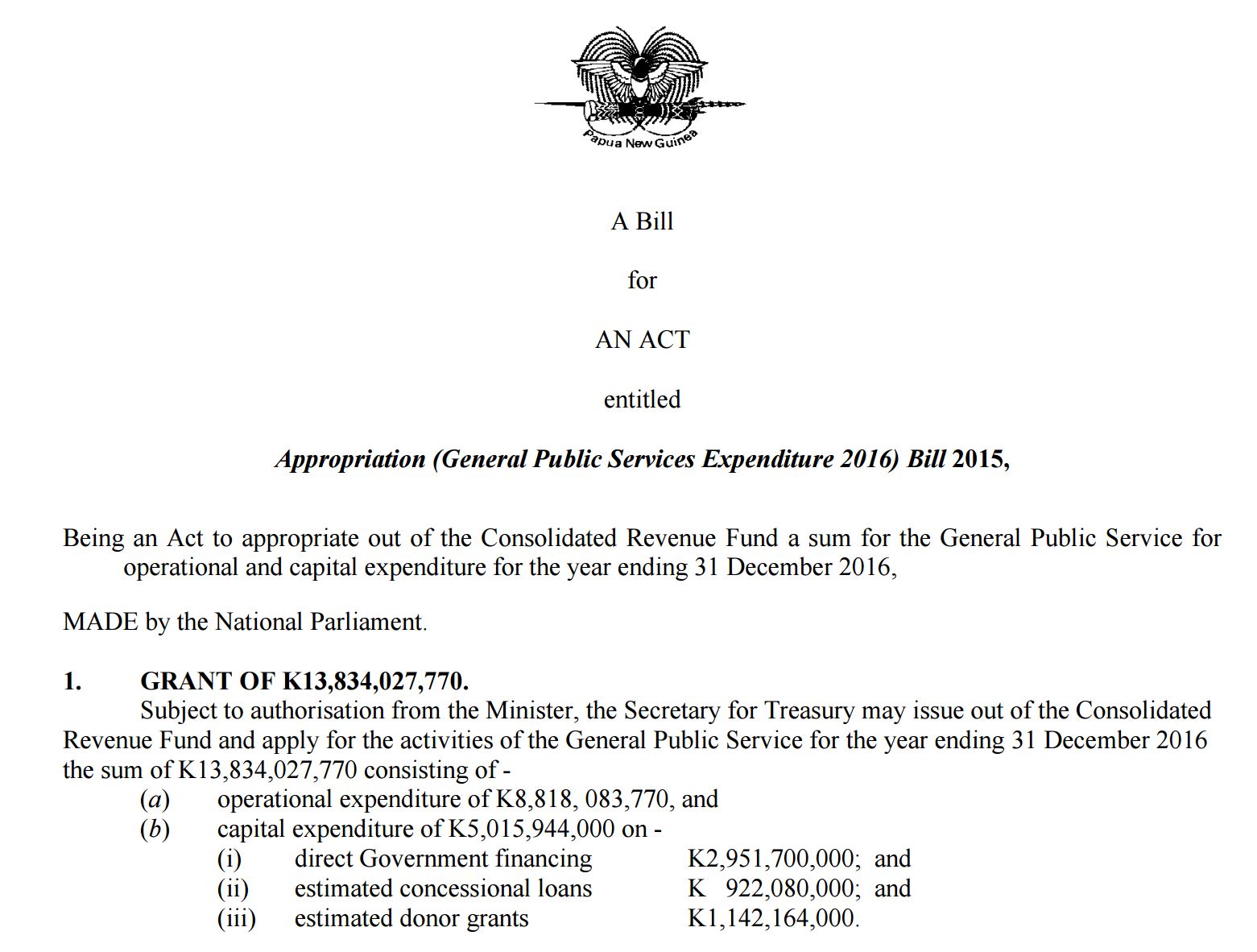
This same total was used in the important Explanatory Notes to Parliament.
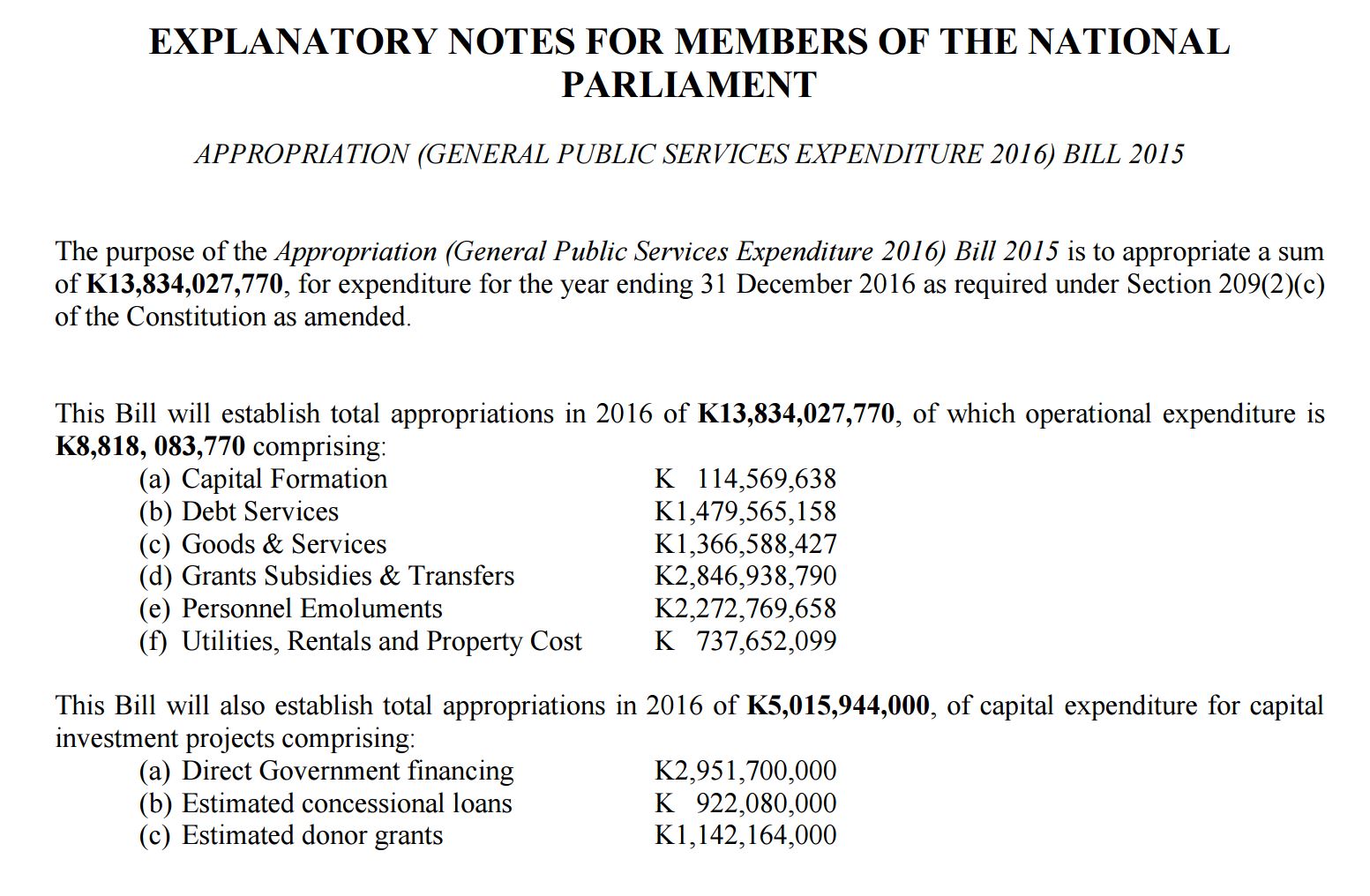
The key issue is that the wrong figure has been included for item (b) Debt Services. K1,479,565,158 was built into the Appropriation Bill. However, this was a mistake – a huge mistake. For this covered only interest payments, not the rollover of government debt.
The correct figure, when looking at Schedule 1 of the 2016 Budget Bill, is 11,330,043,040.
So the mistake is K9,850,477,882 – just under K10 billion.

Looking at the end of the schedule, the correct amount that should be in the all important Clause 1 of the Budget Appropriation for the 2016 Budget should have been K23,684,235,652 looking at the end of Schedule 1 (or possibly K270,000 larger if we add the requested appropriation to the error in debt service noted above).
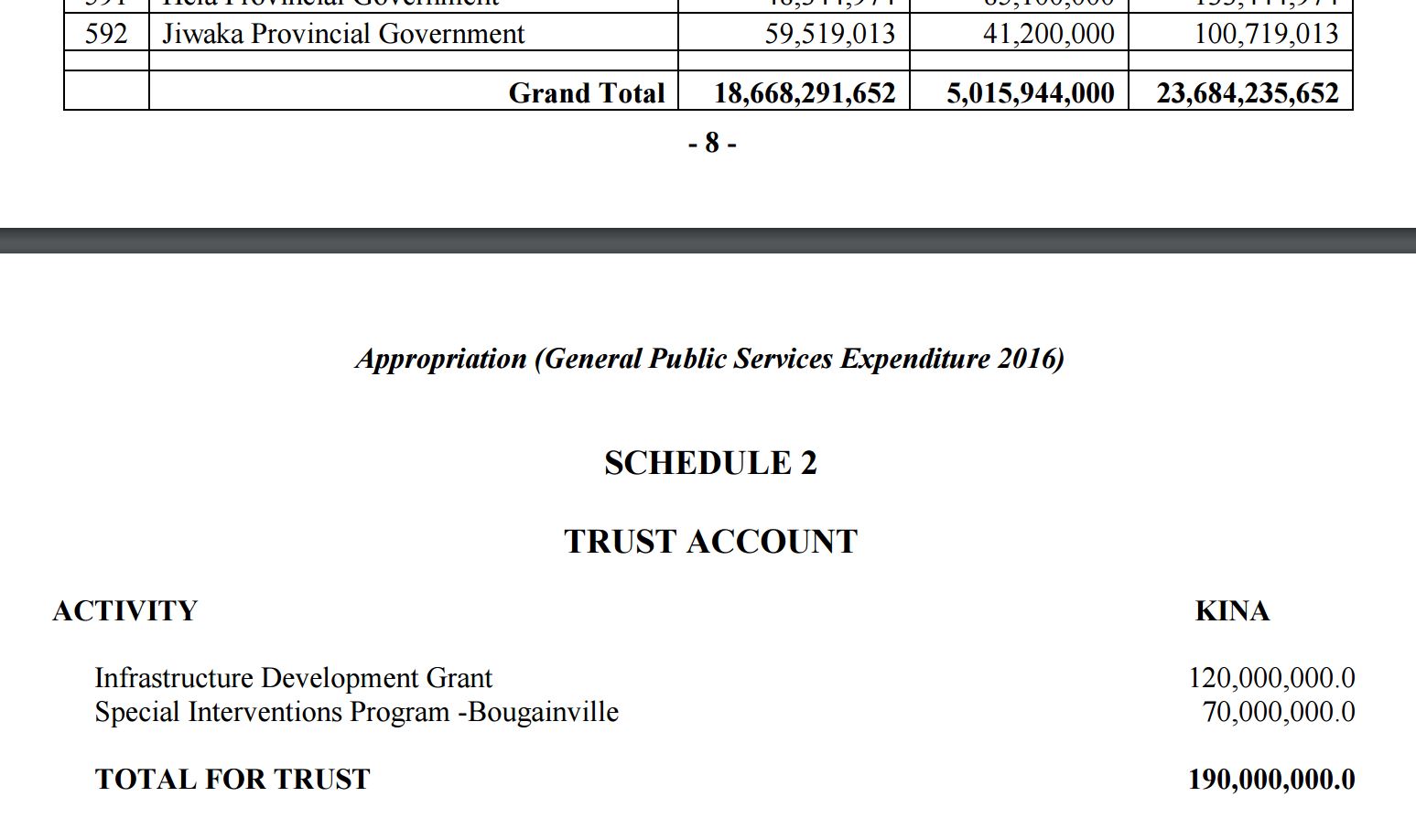
So the 2016 Budget should have allocated some K23.68 billion but it only allocated for expenditure from the Consolidated Revenue Fund the amount of some K13.83 billion.
What does this mean in reality? There clearly was an error, but does it matter? And as the original Bill (now an Act) did include the correct figure in the Schedule, isn’t that good enough?
The relevant part of the PNG constitution is Section 209 shown below.
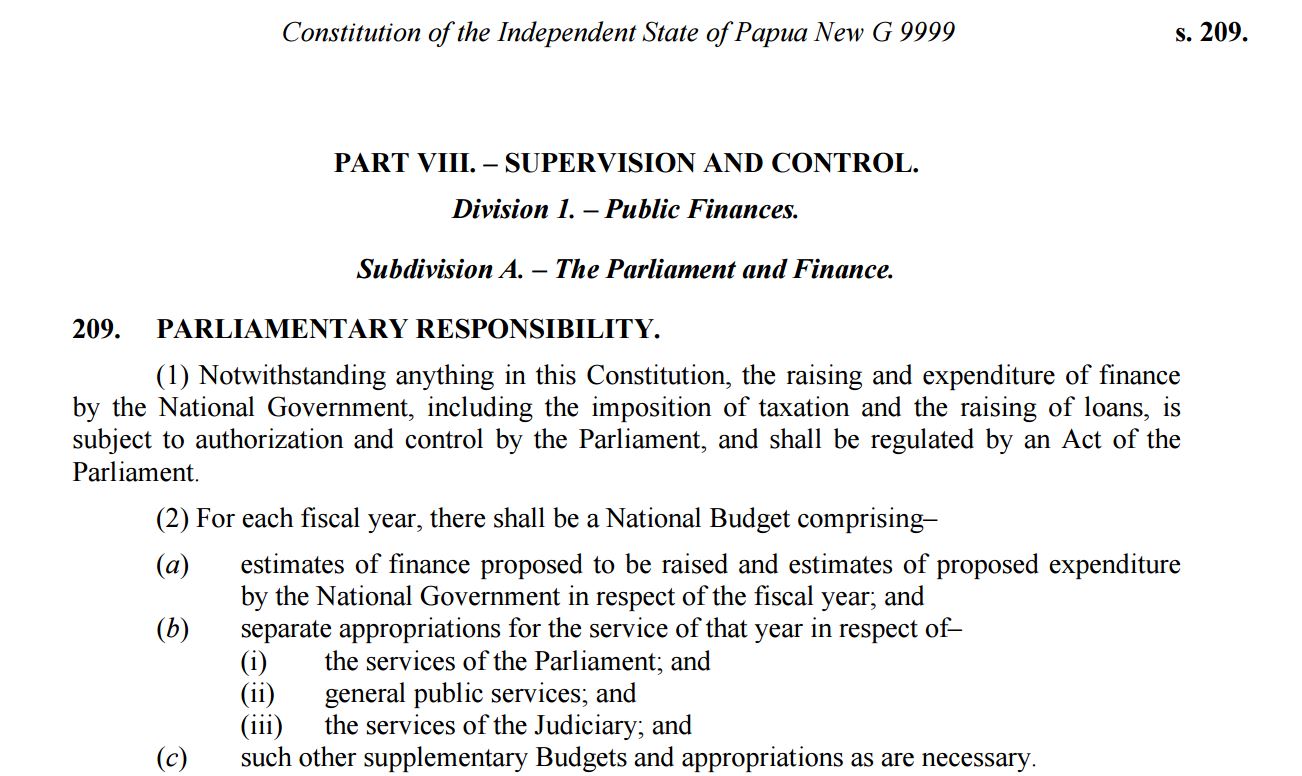
Essentially, only the Parliament can authorise expenditure of finance by the National Government. It does this through an annual National Budget – and this is broken into three separate Appropriation Bills. The one that covers debt servicing, including financing the rollover of that debt, is the “General Public Services” Act above. If the authorisation for financing is not in the Bill, then it is not authorised according to the Constitution.
So financing up to K13.83 billion was authorised in 2016. But not for the K23.68 billion that is required.
Does having the wrong figure in a few places matter? This may end up coming down to a court judgement. As I read it, the error is in the primary clause of the Bill – Clause 1. If there was any ambiguity, the usual practice would then be look at extrinsic material such as the Explanatory Notes to Parliament. But these also use the wrong figure. The correct figure is used in Schedule 1 but this schedule is only referred to in Clause 9, and the purpose of Clause 9 only relates to reallocations between appropriations and debt service – it in no way relates to adjusting the total level of budget financing. My post-graduate training in constitutional law and statutory interpretation at the ANU suggests that there is a very serious error.
The likely only resolution of the error is a new 2016 Appropriation Bill – that is the requirement under the PNG Constitution. That will require re-calling Parliament.
Possibly the interpretation could be that the error was in failing to appropriate financing for rolling over Government debt. This relates to the repayment of Treasury Bills and Treasury Bonds or Inscribed Stock. This would mean that all such repayments this year would be Constitutionally illegal. Until this is clarified, if I was a Superannuation Fund in PNG, I’d certainly seek legal advice before bidding on the next Treasury Bill offering.
More likely, all PNG general public service expenditure above the authorised K13.83 billion is constitutionally invalid (indeed, illegal). However, the 2016 Supplementary Budget has reduced the constitutionally authorised level of financing in 2016 by a further K0.928 billion. Taking this Supplementary Budget figure off both the level of authorised financing as well as the originally planned financing, means only 56.7% of required financing is actually approved by Parliament.
Assuming an even pattern of expenditure throughout the year, legal expenditure stopped in late July or early August (so 56.7% of the way through the year). If in Treasury or Finance, be careful about authorising that next cheque or transfer as it may be constitutionally illegal.
This is a mess. If the government does not act, it may be up to the opposition to seek clarification in the courts.
Once again, this is not a positive reflection on economic management in PNG.

